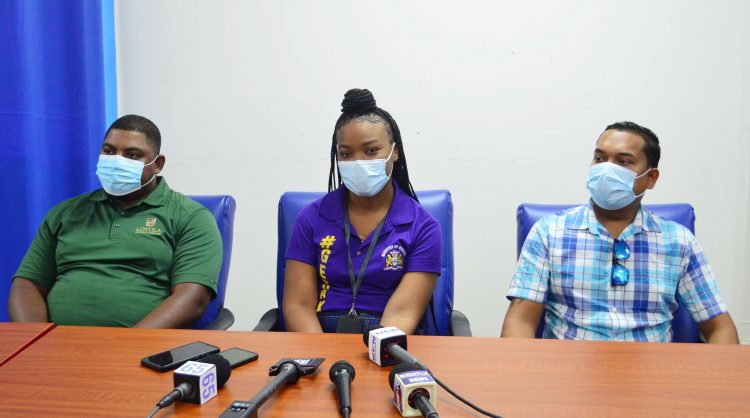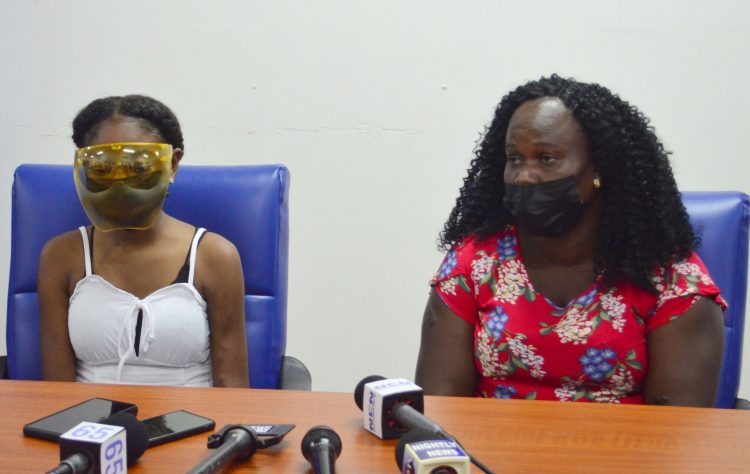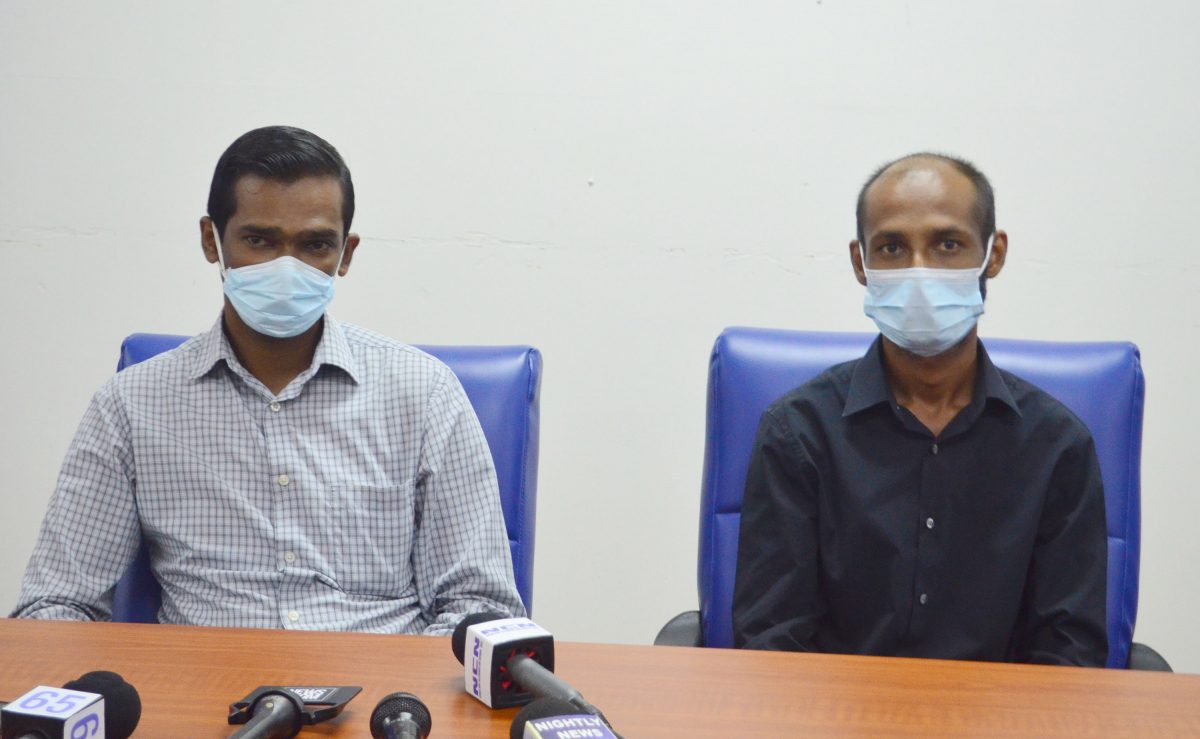The Ministry of Health, through its Chronic Disease Programme, is aiming to expand screening for kidney disease, according to Nephrologist Dr Hemchand Barran.
“We are hoping that we can target detection of kidney disease earlier and deal with it in an earlier stage rather than having our patients showing up at a stage where they need emergency dialysis,” Barran told a news conference that was held on Friday in observation of Kidney Awareness Month.
As of December last year, Barran said, there were 200 patients who were accessing dialysis treatment across the country.


He informed that approximately 10 to 15 of these patients were hospitalised. All of the patients, he added, are in need of kidney transplants.
Dr Barran explained that the leading cause for kidney failure is diabetes. “The age category for us with most kidney failure is from 30 to 50 years old and then I could go a bit broader. Maybe 45 to 65 years old. Those are the categories,” he said while noting that men are more affected than women.
Kidney failure, also called end-stage renal disease, is the last stage of chronic kidney disease.
According to the Mayo Clinic website, acute kidney failure occurs when the kidney suddenly becomes unable to filter waste products from the blood.
The best way to be diagnosed, Dr Barran advised, is through routine check-ups.
According to him, kidney diseases can be reversed if detected at an early stage. “If detected early, you can reverse kidney failure depending on the cause of it. [However] there are some instances where you can’t,” he told the press conference.
Dialysis
Stabroek News yesterday interviewed a number of pre-transplant and post-transplant patients who shared their experiences and how they have been coping.
The pre-transplant patients said they are finding it hard financially to offset the cost for dialysis treatment that is required on a regular basis, while even those who have had transplants said that maintaining the required healthy lifestyles is also costly.
Thirty-three-year-old La Penitence, Georgetown resident Richard Manpersaud was diagnosed with kidney failure in 2016. He had a successful transplant in February, 2018. However, prior to this he was on dialysis treatment for 18 months. “I did both dialysis. I did hemodialysis for a period and I did the peritoneal dialysis too,” Manpersaud said.
While receiving dialysis, Manpersaud explained that there were “on days” and “off days.” “Some days you feel good, sometime you don’t feel good, but all in all without dialysis after kidney failure you cannot go ahead,” he related.
Manpersaud noted that dialysis was “challenging” for him because of the cost for the treatment.
He explained that when he was diagnosed, he was self-employed and had invested in gold mining in the interior. “I came out thinking I had malaria but it wasn’t malaria. So the operation had to be closed down. Financially it was rough on me,” he said.
Fortunately, he said, he received help from family members. “But it couldn’t upkeep with the hemodialysis so I switch to the peritoneal dialysis which is a cheaper option and it’s an easier option too because you can do it from home… Dialysis was challenging for me.”
Like Manpersaud, 39-year-old Juliann Bahadur of Cumberland, Berbice is finding it financially difficult to access dialysis treatment. “It’s very hard financially. Very hard. Its every expensive,” she told reporters.
The mother of three, who also lost her sight due to another medical complaint, started dialysis in November 2021. She is required to have three sessions per a week. First it was okay but now it’s not okay… Some days when you finish dialysis you don’t have no problems and when you go home, you start getting the fever, the cramps, the sticking on your skin, the blazing,” she explained.
Bahadur believes that the government should offer dialysis free of cost to patients, especially those who are unable to work. “I don’t see but I talk to patients at our center in Berbice they also said it’s really expensive for them. If the government can give us free, it can be of great help,” she said.
In September, 2015, Kiran Haridyal was the first patient to receive a kidney transplant at the GPH.
After he was diagnosed with kidney failure, in 2014, the 33-year-old West Coast Demerara resident said doctors tried for almost to year to reverse his diagnosis. “For a whole year, the doctors that I was seeing tried to see if the kidney failure could have been reversed.”
However, they weren’t successful and he began dialysis treatment. “I was having headaches and that led to high blood pressure then I found out I had kidney failure,” he recalled.
Hardyal is advising patients to trust the process. “Being on dialysis is not easy and I would like to encourage all dialysis patients to keep their head up and hang in there. There is light at the end of the tunnel and a transplant is possibly the only reason that you can get a better health. There is no point in giving up when you go through so much during dialysis,” he urged.
He also said that it is important that the doctors’ orders are adhered to.
Dr Bolan Persaud, who is attached to the Georgetown Public Hospital (GPH) transplant and vascular surgery department, related that there are about three instances where kidney diseases can reoccur for patients who had transplants.
“…. Despite transplant is the best form of treatment for kidney failure, it gives you a better quality of life. This kidney can last one day, one week, five years… fifteen years, all based on how you take care of it,” he explained.
Hardyal said he was on dialysis up to the last day before he had his transplant. Following the surgery, he said he was hospitalised for 10 days and discharged. “After transplant I didn’t had no pain or other side effects from the operation and so far I am going pretty good too. I can’t complain,” he said.
Similarly, 26-year-old Malika Dey of Wortmanville, Georgetown, another successful transplant patient, shared that she has had no side effects following the transplant two years ago.
In August 2018, Dey related that she was rushed to the Accident and Emergency Unit after she suffered a seizure. “My dad told me that I crashed and I end up in ICU (Intensive Care Unit) and I was unconscious for twelve days,” she said.
In November, 2018 she started emergency dialysis and continued for six months before she had a transplant. The donor was her father.
Dey admitted that she had to make some adjustments to her life for her own benefit. “I have been healthy, strong. I don’t have any problems,” she said.
“Stuff changed a lot like with your diet… I don’t do a lot of stuff like I use to do before. I take care of my health because being on dialysis isn’t anything easy. Like the doctor would tell us, if you forget your past, you are bound to repeat it,” Dey added.
$600,000 grant
Earlier this year, the government had announced that it will be providing dialysis patients with up to $600,000 annually to help offset the costs of treatment. The provision was made in the 2022 Budget.
Bahadur told reporters that while she is grateful for the grant, it only covers treatment for about six months. “That doesn’t even cover the year. You got to think as a dialysis patient. From my experience, is that you have to get a particular diet that you use. It cost money because you got to buy those stuff. You come to clinic, you got to get finance to pay transportation and so on,” she explained.
But every little bit helps. The family of 16-year-old Adaicia Semple recognize this. For now, she has sponsors who pay for her dialysis treatment.
Semple started dialysis treatment in August, 2021. Three years before this, she was diagnosed with lupus. “Basically it was the same symptoms that I was having before that I am having now. For example, the headaches, they are worse now and the ‘bad feelings’ [nausea] and the weakness,” the teenager explained.
A meeting is scheduled next Wednesday with her doctors and Semple is hoping that she will be given the green light for a transplant.
Her mother, Ulex Semple, told reporters that Adaicia already benefitted from several free sessions of dialysis. “From since then we had to pay until God send her angel to her sponsors… We are praying to have this $600,000 to assist the donor because we don’t want nobody to be burden by our situation… It will fill a lot of holes for us,” Ulex said.
However, Manpersaud said that while his life has returned to normal following the transplant, he cannot afford to keep up with the post-transplant diet.
“[A] general side effect after transplant is weight gain. So I try out the diet and because of the cost of living in the country, it’s not feasible, especially in the city, to eat as healthy as you need to. I am trying my best but I am not getting the result that I need,” he explained.
He is suggesting that the government provide some form of post-transplant assistance to patients. “In terms of tax exemption or something because we like any other patient, normally contribute back to society. We go out back, we work and we pay tax. So that’s just a little recommendation that I think would help us to motivate to live a healthy lifestyle,” he said.






